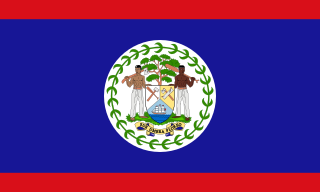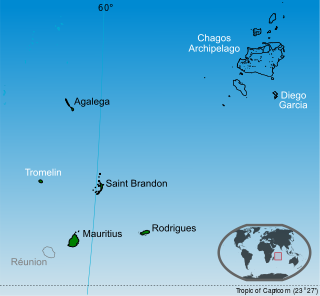
Belize is a country on the north-eastern coast of Central America. It is bordered by Mexico to the north, the Caribbean Sea to the east, and Guatemala to the west and south. It also shares a water boundary with Honduras to the southeast.
Guatemala's major diplomatic interests are regional security and increasingly, regional development and economic integration.

The International Court of Justice is the only international court that adjudicates general disputes between nations, and gives advisory opinions on international legal issues. It is one of the six organs of the United Nations (UN), and is located in The Hague, Netherlands.

The Permanent Court of Arbitration (PCA) is a non-UN intergovernmental organization located in The Hague, Netherlands. Unlike a judicial court in the traditional sense, the PCA provides services of arbitral tribunal to resolve disputes that arise out of international agreements between member states, international organizations or private parties. The cases span a range of legal issues involving territorial and maritime boundaries, sovereignty, human rights, international investment, and international and regional trade. The PCA is constituted through two separate multilateral conventions with a combined membership of 122 states. It is not a United Nations agency, but a United Nations observer.

The Caribbean Court of Justice is the judicial institution of the Caribbean Community (CARICOM). Established in 2005, it is based in Port of Spain, Trinidad and Tobago.

Stephen Myron Schwebel, is an American jurist and international judge, counsel and arbitrator. He previously served as judge of the World Bank Administrative Tribunal (2010–2017), as a member of the U.S. National Group at the Permanent Court of Arbitration, as president of the International Monetary Fund Administrative Tribunal (1993–2010), as president of the International Court of Justice (1997–2000), as vice president of the International Court of Justice (1994–1997), and as Judge of the International Court of Justice (1981–2000). Prior to his tenure on the ICJ, Schwebel served as deputy legal adviser to the U.S. Department of State (1974–1981) and as assistant legal adviser to the U.S. Department of State (1961–1967). He also served as a professor of law at Harvard Law School (1959–1961) and Johns Hopkins University (1967–1981). Schwebel is noted for his expansive opinions in momentous cases such as Legality of the Threat or Use of Nuclear Weapons, Military and Paramilitary Activities in and Against Nicaragua and Oil Platforms .

The Guyana–Venezuela territorial dispute is an ongoing territorial dispute between Guyana and Venezuela over the Essequibo region, also known as Esequibo or Guayana Esequiba in Spanish, a 159,500 km2 (61,600 sq mi) area west of the Essequibo River. The territory, excluding the Venezuelan-controlled Ankoko Island, is controlled by Guyana as part of six of its regions, based on the 1899 Paris Arbitral Award. It is also claimed by Venezuela as the Guayana Esequiba State. The boundary dispute was inherited from the colonial powers and has persisted following the independence of Venezuela and Guyana.

The Belizean–Guatemalan territorial dispute is an unresolved territorial dispute between the states of Belize and Guatemala, neighbours in Central America. During the late 1600s and throughout the 1700s, Britain and Spain signed several treaties regarding territories in the Americas. Both nations agreed that the territory of modern-day Belize was under Spanish sovereignty though British settlers could use the land, in specific areas and for specific purposes. The area was never fully under British or Spanish rule at this time and the British settlers continually expanded far past the boundaries set by the treaties. When the Spanish Empire fell, Guatemala said that it inherited Spain's sovereign rights over the territory. Since independence Guatemala has claimed, in whole or in part, the territory of Belize.

Colombia–Nicaragua relations entail the diplomatic relations between the Republic of Colombia and the Republic of Nicaragua. The relationship between the two Hispanic American countries has evolved amid conflicts over the San Andrés y Providencia Islands located in the Caribbean sea close to the Nicaraguan shoreline and the maritime boundaries covering 150,000 km2 that included the islands of San Andrés, Providencia and Santa Catalina and the banks of Roncador, Serrana, Serranilla and Quitasueño as well as the 82nd meridian west which Colombia claims as a border but which the International Court has sided with Nicaragua in disavowing. The sea around the archipelago has been under Colombian control since 1931 when a treaty was signed during US occupation of Nicaragua, giving Colombia control over the area. Both nations are members of the Association of Caribbean States, Community of Latin American and Caribbean States, Organization of American States, Organization of Ibero-American States and the United Nations.

Guyana–Venezuela relations include diplomatic, economic and other interactions between the neighboring countries of the Co-operative Republic of Guyana and the Bolivarian Republic of Venezuela.

Sovereignty over the Chagos Archipelago is disputed between Mauritius and the United Kingdom. Mauritius has repeatedly stated that the Chagos Archipelago is part of its territory and that the United Kingdom claim is a violation of United Nations resolutions banning the dismemberment of colonial territories before independence. On 22 May 2019, the United Nations General Assembly adopted a non-binding resolution declaring that the archipelago was part of Mauritius, with 116 countries voted in favor of Mauritius while six opposed it.

General elections were held in Guatemala on 6 September 2015 to elect the President and Vice President, all 158 Congress deputies, all 20 deputies to the Central American Parliament, and mayors and councils for all 338 municipalities in the country.

The Guatemala–Honduras adjacency line is a disputed international boundary separating Guatemala on the north and west from Honduras on the south and east. The border dispute and being adjudicated in the ICJ as of 2019.

The Constitution of Costa Rica is the supreme law of Costa Rica. At the end of the 1948 Costa Rican Civil War, José Figueres Ferrer oversaw the Costa Rican Constitutional Assembly, which drafted the document. It was approved on 1949 November 7. Several older constitutions had been in effect starting from 1812, with the most recent former constitution ratified in 1871. The Costa Rican Constitution is remarkable in that in its Article 12 abolished the Costa Rican military, making it the second nation after Japan to do so by law. Another unusual clause is an amendment asserting the right to live in a healthy natural environment.
Julio René AlvaradoRuano was a fourteen-year-old Guatemalan boy who was killed in the Belize–Guatemala adjacency zone during an armed confrontation between the Belize Defence Force, Belizean park rangers, and Guatemalan farmers. The incident raised tensions between Belize and Guatemala, who have an ongoing border dispute since 1821. Belizean officials maintain that the Belize Defence Force acted in self-defence. However, the Guatemalan government claims the incident was a deliberate attack carried out by Belize's military. After the incident, the Organisation of American States agreed to investigate the death of Julio Alvarado at the request of both countries.

General elections were held in Guatemala on 16 June 2019, to elect the president, Congress and local councils. A second round of the presidential elections was held on 11 August 2019, since no candidate won a majority in the first round. Alejandro Giammattei won the election in the second round of voting.
A referendum on the territorial dispute with Guatemala was held in Belize on 8 May 2019. Voters were asked whether the territorial dispute with neighbouring Guatemala should be referred to the International Court of Justice.

Movimiento Semilla is a centre-left, progressivist, social-democratic political party in Guatemala. As of January 14, 2024, it became Guatemala's current government party.

A consultative referendum was initiated by the government of Nicolás Maduro regarding Venezuela's claim over the Guayana Esequiba, whose territory is disputed with, and controlled by, neighboring Guyana. The referendum took place on 3 December 2023 in Venezuela. The population of the territory in question was not consulted and did not vote as voting only took place within Venezuela.














